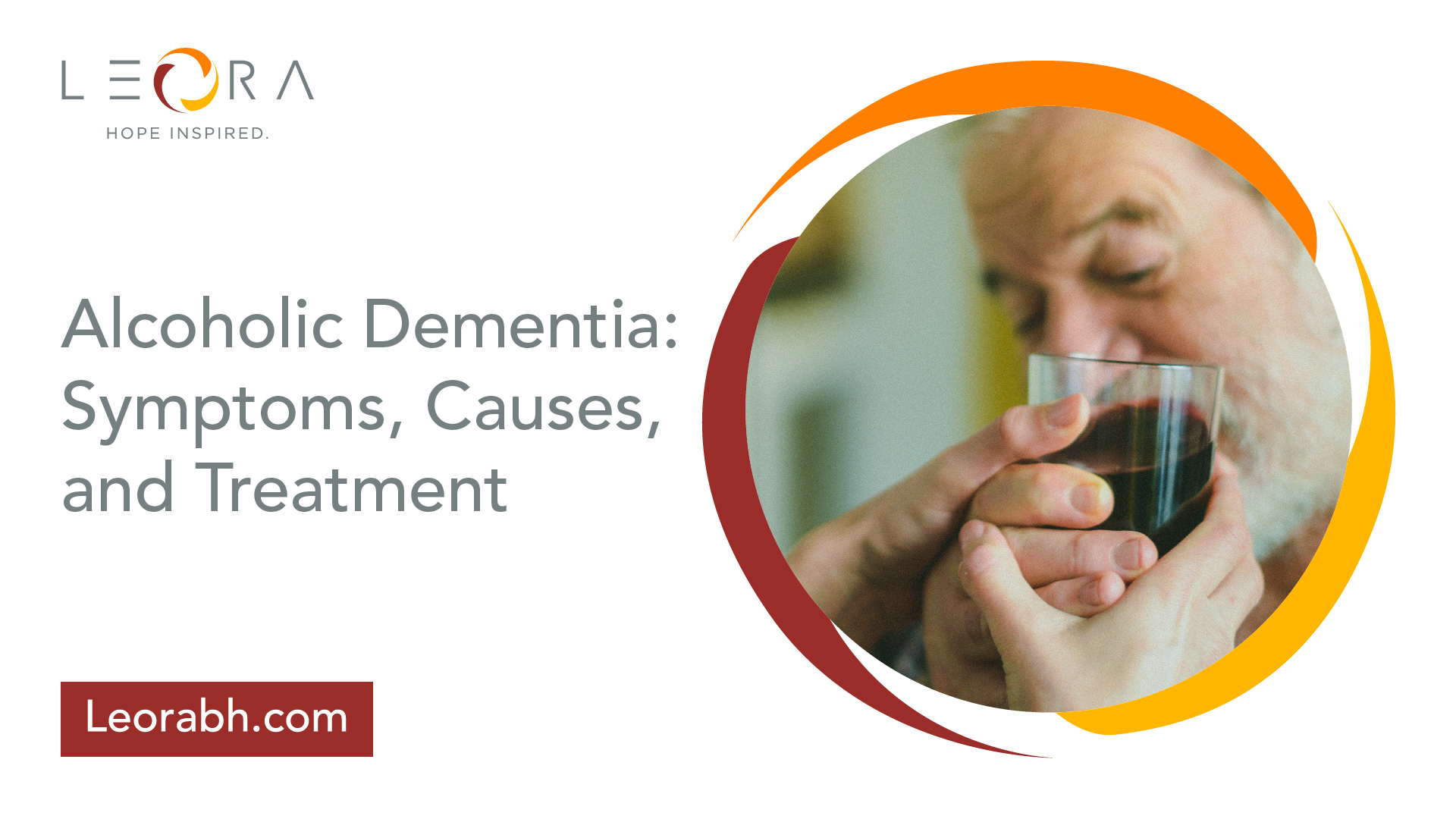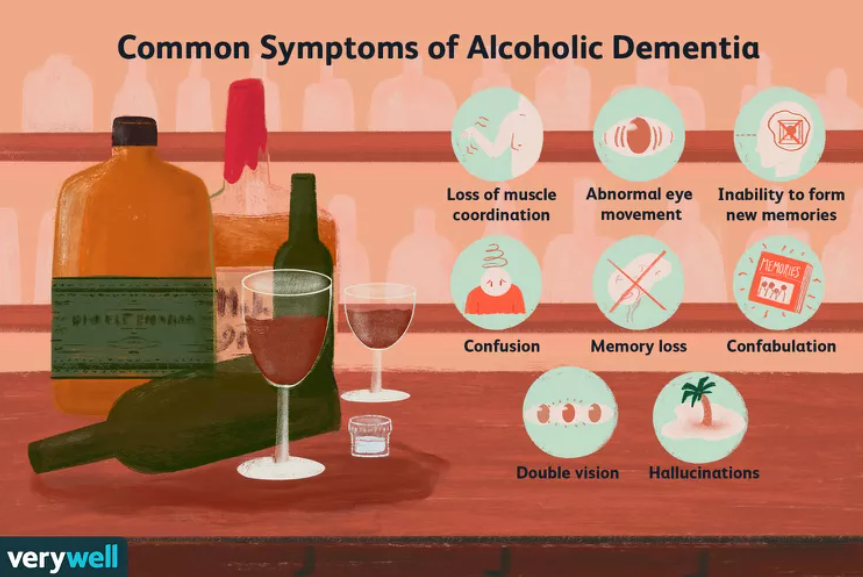Alcoholic Dementia: Symptoms, Causes, and Treatment
Discover the signs of alcoholic dementia! From cognitive symptoms to behavioral changes, learn how to recognize and manage the condition.
Understanding Alcoholic Dementia
Alcoholic dementia is a condition that affects individuals who have a history of long-term alcohol abuse. It is a form of dementia that is specifically linked to excessive alcohol consumption. In this section, we will explore what alcoholic dementia is and the causes and risk factors associated with it.

What is Alcoholic Dementia?
Alcoholic dementia, also known as alcohol-related dementia or alcohol-induced dementia, is a neurocognitive disorder characterized by a decline in cognitive function as a result of chronic alcohol abuse. Prolonged and excessive alcohol consumption can cause damage to the brain, leading to cognitive impairment and dementia-like symptoms.
Unlike other forms of dementia, alcoholic dementia is directly associated with alcohol misuse. The consumption of large amounts of alcohol over an extended period can have a detrimental impact on brain structure and function, resulting in cognitive deficits and behavioral changes.
Causes and Risk Factors
The primary cause of alcoholic dementia is the neurotoxic effects of alcohol. When consumed in excess, alcohol acts as a central nervous system depressant and can cause damage to brain cells. The specific mechanisms behind the development of alcoholic dementia are still being studied, but it is believed to involve several factors, including:
- Alcohol neurotoxicity: Prolonged alcohol use can lead to neurotoxic effects on the brain, causing neuronal damage and impairing cognitive function.
- Nutritional deficiencies: Alcohol abuse often goes hand-in-hand with poor nutrition, leading to deficiencies in essential vitamins and minerals that are necessary for optimal brain health.
- Liver dysfunction: Chronic alcohol abuse can result in liver damage, leading to the accumulation of toxins in the body, which can affect brain function.
- Genetic factors: Some individuals may have a genetic predisposition to developing alcoholic dementia, making them more vulnerable to the effects of alcohol on the brain.
While excessive alcohol consumption is the primary risk factor for developing alcoholic dementia, other factors can increase the likelihood of its occurrence. These include:
- Duration and severity of alcohol abuse: The longer and more severe the alcohol abuse, the higher the risk of developing alcoholic dementia.
- Age and gender: Older individuals who have been heavy drinkers for many years are at a higher risk, and men are generally more susceptible than women.
- Co-existing medical conditions: Individuals with pre-existing medical conditions, such as liver disease or certain psychiatric disorders, may be more prone to developing alcoholic dementia.
Understanding the causes and risk factors associated with alcoholic dementia is essential for raising awareness and promoting early intervention and prevention strategies.
Alcoholic Dementia Symptoms
Alcoholic dementia is characterized by a range of symptoms that can affect various aspects of a person's functioning. These symptoms can be grouped into three categories: cognitive symptoms, behavioral and psychological symptoms, and physical symptoms.

Cognitive Symptoms
Cognitive symptoms are often the hallmark of alcoholic dementia. They refer to changes in a person's thinking and memory abilities. Individuals with alcoholic dementia may experience:
- Memory loss: Difficulty remembering recent events, appointments, or conversations.
- Impaired attention and concentration: Trouble focusing or staying attentive for extended periods.
- Executive dysfunction: Difficulties with planning, organizing, problem-solving, and decision-making.
- Language and communication problems: Trouble finding the right words, expressing thoughts clearly, or understanding complex sentences.
- Decreased processing speed: Slower thinking and reduced ability to process information quickly.
- Disorientation: Feeling confused or getting lost, even in familiar surroundings.
Behavioral and Psychological Symptoms
Alcoholic dementia can also manifest through various behavioral and psychological symptoms. These symptoms may impact a person's emotions, personality, and overall behavior. Some common behavioral and psychological symptoms include:
- Mood swings: Rapid and unpredictable changes in mood, such as irritability, agitation, or apathy.
- Anxiety and depression: Feelings of unease, restlessness, sadness, or loss of interest in once-enjoyable activities.
- Social withdrawal: Avoiding social interactions or isolating oneself from friends and family.
- Impulsivity and disinhibition: Acting without thinking, engaging in risky behaviors, or displaying poor judgment.
- Lack of insight: Difficulty recognizing or acknowledging the impact of their symptoms on themselves and others.
- Personality changes: Alterations in personality traits, such as becoming more aggressive, suspicious, or apathetic.
Physical Symptoms
In addition to cognitive and behavioral changes, individuals with alcoholic dementia may also experience certain physical symptoms. These symptoms can include:
- Motor problems: Difficulties with coordination, balance, and fine motor skills.
- Tremors: Involuntary shaking of the hands or other body parts.
- Gait disturbances: Unsteady or uncoordinated walking patterns.
- Muscle weakness: Reduced strength and muscle control.
- Nutritional deficiencies: Malnutrition due to poor dietary habits often associated with chronic alcohol abuse.
It's important to note that the severity and progression of these symptoms can vary from person to person. If you or someone you know is experiencing these symptoms, it is crucial to seek medical evaluation and guidance for accurate diagnosis and appropriate treatment.

Diagnosing Alcoholic Dementia
When it comes to diagnosing alcoholic dementia, a comprehensive evaluation is necessary to assess the individual's cognitive, behavioral, and physical symptoms. This section will explore the diagnostic process for alcoholic dementia and the importance of differential diagnosis.
The Diagnostic Process
Diagnosing alcoholic dementia involves a thorough assessment of the individual's medical history, alcohol consumption patterns, and comprehensive neuropsychological testing. The healthcare provider will begin by conducting a detailed interview to gather information about the individual's symptoms, alcohol use, and any other relevant medical conditions.
During the interview, the healthcare provider will inquire about the onset and progression of symptoms, including any changes in memory, thinking abilities, behavior, or physical functioning. It is essential for the individual to be honest and open about their alcohol consumption habits, as excessive and prolonged alcohol abuse is a critical risk factor for alcoholic dementia.
Following the interview, a series of neuropsychological tests will be administered to evaluate the individual's cognitive functioning. These tests assess various cognitive domains, including memory, attention, language, and executive functions. The results of these tests can help determine the extent and nature of cognitive impairment.
In addition to the interview and neuropsychological testing, imaging studies such as magnetic resonance imaging (MRI) or computed tomography (CT) scans may be conducted to rule out other potential causes of dementia, such as structural brain abnormalities or other neurodegenerative conditions. These imaging studies can provide valuable insights into the brain structure and help identify any abnormalities that may contribute to the symptoms.
Differential Diagnosis
Differential diagnosis is a crucial step in the diagnostic process for alcoholic dementia. It involves differentiating alcoholic dementia from other forms of dementia and identifying any underlying coexisting conditions that may be contributing to the symptoms. Some of the conditions that need to be considered during the differential diagnosis include:
- Alzheimer's disease: Alzheimer's disease is the most common form of dementia and shares some similarities with alcoholic dementia. Neuropsychological testing and imaging studies can help differentiate between the two conditions.
- Vascular dementia: Vascular dementia is caused by impaired blood flow to the brain and can present with similar symptoms to alcoholic dementia. A careful assessment of the individual's medical history and imaging studies can help distinguish between the two.
- Other substance-induced dementias: Chronic use of substances other than alcohol, such as certain drugs or medications, can also lead to cognitive impairment. It is important to rule out these substances as potential causes of the symptoms.
- Other neurological conditions: Conditions such as Parkinson's disease, Huntington's disease, or normal pressure hydrocephalus can present with cognitive symptoms similar to alcoholic dementia. A thorough evaluation can help identify these conditions and guide appropriate management.
By conducting a comprehensive diagnostic process and considering differential diagnoses, healthcare providers can accurately diagnose alcoholic dementia. This diagnosis is crucial for developing an appropriate treatment and management plan to address the individual's specific needs.
Treatment and Management
When it comes to alcoholic dementia, treatment and management strategies aim to address the symptoms and improve the individual's overall quality of life. The approach typically involves a combination of lifestyle changes, medications and therapies, and supportive care.
Lifestyle Changes
Making certain lifestyle changes can be beneficial for individuals with alcoholic dementia. These changes may include:
- Alcohol cessation: The most crucial step in managing alcoholic dementia is to completely abstain from alcohol. It is important to seek help and support for alcohol abuse to prevent further damage to the brain.
- Healthy diet: Consuming a well-balanced diet rich in nutrients, vitamins, and minerals can support brain health. A diet that includes fruits, vegetables, whole grains, lean proteins, and healthy fats is recommended.
- Regular exercise: Engaging in regular physical activity can have numerous benefits for overall health, including brain health. Exercise helps improve blood flow to the brain and promotes the production of endorphins, which can enhance mood and cognitive function.
- Cognitive stimulation: Engaging in mentally stimulating activities, such as puzzles, reading, or learning new skills, can help maintain cognitive function and improve overall well-being.
Medications and Therapies
In some cases, medications may be prescribed to manage specific symptoms associated with alcoholic dementia. These medications may include:
- Cholinesterase inhibitors: These drugs can help improve cognitive function and memory. They work by increasing the levels of certain chemicals in the brain involved in memory and thinking.
- Antidepressants: Individuals with alcoholic dementia may experience mood disturbances, such as depression. Antidepressant medications can help manage these symptoms and improve overall emotional well-being.
- Anti-anxiety medications: If anxiety symptoms are present, anti-anxiety medications may be prescribed to help alleviate anxiety and promote a sense of calm.
Therapies can also play a crucial role in the treatment and management of alcoholic dementia. These may include:
- Cognitive rehabilitation: This type of therapy focuses on improving cognitive skills and helping individuals develop strategies to compensate for any cognitive deficits.
- Behavioral therapy: Behavioral therapy can assist individuals in modifying problematic behaviors and developing healthier coping mechanisms.
- Support groups and counseling: Participating in support groups or individual counseling sessions can provide emotional support, education, and guidance for both individuals with alcoholic dementia and their caregivers.
Supportive Care
Supportive care is an essential component of managing alcoholic dementia. It involves providing assistance and support to individuals with alcoholic dementia to help them maintain their independence and improve their overall well-being. Supportive care may include:
- Assistance with daily activities: Help with activities of daily living, such as bathing, dressing, and meal preparation, may be necessary as the disease progresses.
- Safety measures: Implementing safety measures at home, such as removing tripping hazards and installing handrails, can help prevent accidents and injuries.
- Caregiver support: Caregivers play a crucial role in the management of alcoholic dementia. Providing support and resources to caregivers can help alleviate stress and ensure they have the necessary tools to care for their loved ones.
By implementing lifestyle changes, utilizing appropriate medications and therapies, and providing supportive care, individuals with alcoholic dementia can experience improved symptom management and a better quality of life. It is important to consult with healthcare professionals for personalized treatment plans and guidance throughout the journey of managing alcoholic dementia.

Preventing Alcoholic Dementia
While alcoholic dementia can be a devastating condition, there are steps that can be taken to reduce the risk of developing this condition. By making certain lifestyle changes, seeking help for alcohol abuse, and promoting brain health, individuals can take proactive measures to protect their cognitive well-being.
Reducing Alcohol Consumption
One of the most effective ways to prevent alcoholic dementia is by reducing alcohol consumption. Excessive and prolonged alcohol use is a significant risk factor for developing this condition. It's important to adhere to recommended guidelines for alcohol consumption to minimize the potential damage to the brain.
The table below outlines the recommended limits for alcohol consumption:
Gender Recommended Limits
Men: Up to 2 standard drinks per day
Women: Up to 1 standard drink per day
It's crucial to understand that alcohol affects individuals differently, and some people may be more susceptible to the negative effects of alcohol on the brain. By moderating alcohol intake and staying within the recommended limits, individuals can lower their risk of developing alcoholic dementia.
Seeking Help for Alcohol Abuse
For individuals struggling with alcohol abuse or addiction, seeking help is essential in preventing the progression of alcoholic dementia. Recognizing the problem and reaching out to healthcare professionals, support groups, or addiction treatment centers can provide the necessary resources and guidance to overcome alcohol dependency.
Treatment options for alcohol abuse may include counseling, therapy, support groups, and sometimes medication. It's important to consult with healthcare professionals to determine the most appropriate treatment plan for each individual's unique needs.
Promoting Brain Health
Taking steps to promote brain health can also play a significant role in preventing alcoholic dementia. Here are some strategies to consider:
- Adopting a Healthy Lifestyle: Engaging in regular physical exercise, maintaining a balanced diet, and getting adequate sleep can support overall brain health.
- Stimulating the Mind: Engaging in mentally stimulating activities, such as reading, puzzles, and learning new skills, can help keep the brain active and potentially reduce the risk of cognitive decline.
- Managing Chronic Conditions: Effectively managing chronic conditions like hypertension, diabetes, and high cholesterol can contribute to better brain health and reduce the risk of dementia.
- Avoiding Smoking: Smoking has been linked to an increased risk of dementia, including alcoholic dementia. Quitting smoking or avoiding tobacco altogether can have positive effects on brain health.
- Staying Socially Engaged: Maintaining social connections and engaging in social activities can help support cognitive function and overall well-being.
By implementing these strategies and making conscious choices to prioritize brain health, individuals can take proactive steps towards preventing alcoholic dementia.
Preventing alcoholic dementia requires a multi-faceted approach that includes reducing alcohol consumption, seeking help for alcohol abuse, and promoting brain health through healthy lifestyle choices. By taking these measures, individuals can work towards maintaining their cognitive function and overall well-being.
Sources
Tips to keep your brain healthy
Find Your Inner Light
Related Articles
Contact Us
Leora Behavioral Health offers a comprehensive addiction treatment programs to help you get your life back on track.
Our trained professionals will work with you to develop a personalized treatment plan that meets your unique needs. If you or someone you know is struggling with addiction, reach out to Leora Behavioral Health today.


.svg)





.svg)
.svg)
.svg)
.svg)